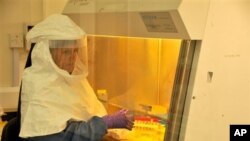Deadly Ebola hemorrhagic fever has struck again in Central Africa. The outbreak was first reported in the Kibaale District in western Uganda, claiming 16 lives. A health worker who treated the Kibaale victims died in the capital Kampala, and it is believed at least 38 persons may have contracted the highly infectious disease so far.
A team from the United States Centers for Disease Control and Prevention, or CDC, has been dispatched to the region in response to the emergency. They will work together with health experts from the Ugandan government and the World Health Organization to help identify cases of the disease, trace people who may have come into contact with the victims, help strengthen practices to control the spread of the virus among health workers and educate people on avoiding infection.
There is no vaccine or cure for those infected by the Ebola, which is transmitted by direct contact with the blood and/or secretions of an infected person. With timely identification, however, patients can receive supportive therapy such as balancing fluids, maintaining blood pressure and treatment for any complicating infections.
Our nation’s response to the emergency is part of an ongoing commitment to the health and welfare of Ugandans and all citizens of Africa. Uganda has seen three major Ebola outbreaks over the past 12 years, the deadliest in 2000 and 2001 that killed 224 people.
In 2008, Ebola claimed 15 lives in the Democratic Republic of the Congo. To address this threat, the CDC maintains reference laboratories throughout Africa, including a lab at the Uganda Virus Research Institute in Entebbe. It was this facility that received and identified a patient sample from Kibaale, alerting authorities of the threat.
Nor is the effort confined to Uganda. As part of its ongoing mission, the CDC’s Viral Special Pathogens Branch works every day to better understand and address the burden of Ebola.













